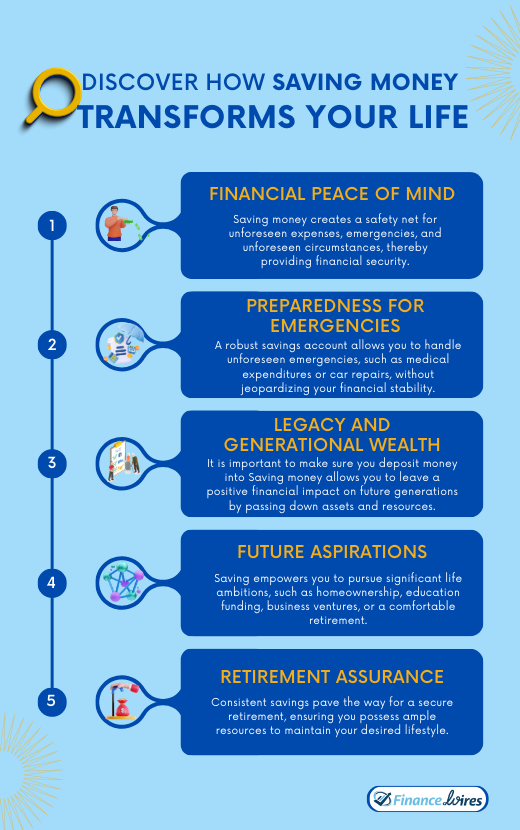
How to Save Money with a Family: Top 15 Strategies
- FinanceWires
- 10 Aug, 2023
In the journey of life, families often find themselves navigating the delicate balance of financial responsibilities. It's a path filled with love, joy, and, at times, challenges that can feel overwhelming.
Managing a family's finances can sometimes feel like navigating a complex maze, but with the right strategies, it's possible to achieve financial stability while still enjoying life's pleasures.
We understand that the road isn't always smooth, especially when coping with the pain of loss. But remember, you're not alone. In this guide, we'll gently walk you through 10 strategies to save money and build financial stability while finding moments of solace along the way.

Top 15 Strategies to Save Money with a Family
Managing a family budget can be a challenging task, but with careful planning and a few strategic approaches, it's possible to save money without compromising on the quality of life. Whether you're looking to build an emergency fund, pay off debts, or simply achieve financial stability, employing effective money-saving strategies is key.
In this article, we'll explore 15 practical strategies that families can implement to save money and achieve their financial goals. From smart shopping habits and energy conservation to meal planning and entertainment choices, these strategies can help families navigate the complex landscape of expenses and ensure a brighter financial future.
By making deliberate choices and working together as a team, families can create a sustainable and prosperous financial environment for everyone. Here are the strategies:
1. Create a Comprehensive Family Budget

In the whirlwind of family life, keeping track of income and expenses might seem challenging, but it's the cornerstone of effective money management. By understanding where your money goes, you can make informed decisions to cut unnecessary costs and boost savings. Consider these steps:
- Importance of Tracking: Start by meticulously recording all sources of income and every expense, from bills to that morning's coffee.
- Fixed vs. Variable Expenses: Categorize expenses into fixed (unchanging) and variable (fluctuating) to identify where you can cut back.
- Budgeting Apps and Tools: Explore user-friendly apps and tools that streamline budgeting, making it easier to visualize and control your finances.
2. Allocate Funds for Essential Expenses

Prioritizing is key when allocating funds for expenses. By making thoughtful choices, you can ensure that you're meeting your family's essential needs while avoiding unnecessary splurges.
- Necessities First: Housing, utilities, and groceries should always come first in your budget.
- Setting Spending Limits: Create limits for discretionary spendings, like eating out or entertainment, to prevent overspending.
3. Meal Planning and Bulk Cooking

Planning meals in advance can save both time and money. By buying in bulk and cooking at home, you'll not only cut costs but also foster healthier eating habits.
- Benefits of Planning: Plan your meals for the week to avoid last-minute takeout and impulse buys.
- Buying in Bulk: Bulk buying staples can lead to significant savings on your grocery bill.
- Avoid Dining Out Impulsively: When you plan ahead, you'll be less likely to opt for pricier restaurant meals.
4. Energy and Water Conservation

Conserving energy and water not only reduces your bills but also contributes to a more sustainable future. Small changes can add up to big savings.
- Turn Off Lights and Appliances: Develop a habit of switching off lights and unplugging appliances when not in use.
- Fixing Leaks and Efficient Fixtures: Address leaks promptly and invest in energy-efficient light bulbs and appliances.
- Mindful Water Usage: Simple practices like shorter showers and fixing dripping faucets can lead to significant water savings.
5. Comparison Shopping for Big Purchases

Before making major purchases, take the time to research and compare prices. This simple step can help you secure the best deals.
- Do Your Research: Don't rush into big purchases. Compare prices and read reviews to ensure you're making an informed decision.
- Price Comparison Websites: Utilize online tools to find the best deals across different retailers.
- Wait for Sales and Discounts: Patience can pay off – waiting for sales events can lead to substantial savings.
You can also search in facebook marketplace for better options.
6. Embracing Secondhand Shopping

Gently-used items can be just as valuable as new ones, often at a fraction of the cost. By embracing secondhand shopping, you'll save money while reducing waste.
- Thrift Stores and Online Marketplaces: Explore thrift stores and online platforms for pre-loved items.
- Gently Used Items: From clothing to electronics, many items are still in excellent condition when bought secondhand.
- Supporting Sustainability: Secondhand shopping aligns with a sustainable lifestyle, benefiting both your wallet and the environment.
7. Establishing an Emergency Fund

Life is unpredictable, and having an emergency fund provides a safety net during tough times. Building this fund should be a priority because it also helps when you need to manage your personal loan payments.
- Safety Net Importance: Unexpected expenses won't derail your finances if you have an emergency fund in place.
- Allocating a Percentage: Set aside a portion of your income specifically for your emergency fund.
- Debt Prevention: An emergency fund can prevent resorting to high-interest debt in times of need.
8. Saving for Education and Retirement

Investing in your family's education and future retirement might seem distant, but starting early can have a profound impact. Saving money can save you from taking student financial loans.
- Early Education Savings: Explore education savings accounts to ensure your children's educational needs are met.
- Retirement Planning: Investigate various retirement savings options, understanding the power of compound interest in long-term planning.
9. Prioritizing Debt Repayment

Debt can be a heavy burden, but with strategic planning, you can overcome it. Prioritizing repayment is the first step.
- List and Categorize Debts: Make a list of all your debts and categorize them by interest rates and amounts.
- Snowball or Avalanche Method: Decide on a repayment strategy – either focusing on the smallest debts first (snowball) or the highest interest debts (avalanche).
- Negotiate with Creditors: If needed, don't hesitate to communicate with your creditors to negotiate terms that work for you.
10. Avoiding New Debts
Preventing new debts is equally important as repaying existing ones. Building good financial habits is essential. Along with building finance you can also focus on building wealth and giving.
- Responsible Credit Card Use: If you use credit cards, pay off the balance in full each month to avoid interest charges.
- Distinguish Needs from Wants: Before making a purchase, evaluate whether it's a genuine need or a mere want.
- Cash-Only Mindset: Consider adopting a cash-only approach for discretionary spending to stay within budget.
11. Exploring Free and Low-Cost Activities

Entertaining your family doesn't have to break the bank or family finances. Utilize local resources for budget-friendly fun.
- Community Resources: Parks, libraries, and community centers offer free or low-cost activities for families.
- Local Events and Festivals: Participate in local events and festivals that provide entertainment without excessive spending.
- Quality Time Without Overspending: Family bonding doesn't require expensive outings – simple pleasures can create cherished memories.
12. DIY and Creative Hobbies
Engaging in do-it-yourself projects and creative hobbies can be rewarding and cost-effective, promoting both skill development and family bonding.
- Crafting and DIY Projects: Experiment with crafting, DIY home improvements, or even gardening to save on hiring professionals.
- Learning New Skills: Engage your family in learning new skills together, whether it's cooking, painting, or woodworking.
- Personalized Gifts: Create thoughtful gifts by hand, saving money and showing your loved ones how much you care.
13. Regular Family Financial Meetings

Open communication about finances is crucial within a family. Family financial planning is an important element. Holding regular financial meetings keeps everyone on the same page. It also helps in building social entrepreneurship.
- Discussing Goals and Progress: Share your financial goals and review your progress as a family.
- Adapting to Change: Be flexible with circumstances change and adjusting your budget accordingly is essential.
14. Teaching Financial Literacy to Children

Instilling financial literacy in your children from a young age sets the stage for their future financial success. Start small and gradually introduce them to money concepts.
- Basic Money Concepts: Begin with simple explanations of saving, spending, and the importance of making wise choices.
- Allowances and Savings: Set up allowances for your children, encouraging them to save a portion and spend responsibly.
- Early Habits, Lasting Impact: Cultivate responsible money habits early on to lay a strong foundation for their financial future.
15. Set Clear Financial Goals: Crafting Your Family's Dreams
Just as you've cherished your family's dreams, it's essential to put them into words. Whether it's saving for your child's education or future home, define your goals together. In times of loss, setting goals can provide a guiding light, a reminder of the beautiful journey you're on.
Benefits of Saving Money

Saving money is a very good practice. Here are some brief benefits of saving money:
- Financial Security: Saving money creates a safety net for unexpected expenses, emergencies, and unforeseen circumstances, providing you with financial peace of mind.
- Future Goals: Saving allows you to work towards important life goals, such as buying a home, funding education, starting a business, or retiring comfortably.
- Debt Prevention: Building savings helps you avoid going into debt for unplanned expenses, reducing reliance on credit cards and loans. If you save money it also help you to manage debates and controversies when you need.
- Compound Interest: Savings grow over time due to compound interest, where your money earns interest on both the initial amount and the accumulated interest.
- Retirement Planning: Regular savings can lead to a comfortable retirement, ensuring you have sufficient funds to maintain your desired lifestyle.
- Opportunity Fund: Having savings gives you the flexibility to seize opportunities like investments, travel, or career changes without financial stress.
- Peace of Mind: Knowing you have a financial cushion provides a sense of security and reduces stress related to money matters.
- Independence: Savings can provide you with the freedom to make choices based on your preferences without being solely dictated by financial constraints.
- Emergency Preparedness: A robust savings account helps you navigate unexpected emergencies, like medical bills or car repairs, without disrupting your financial stability.
- Legacy and Generational Wealth: Saving money allows you to leave a positive financial impact on future generations by passing down assets and resources.
Remember, even small contributions to savings can accumulate over time and lead to significant benefits.
Conclusion
Saving money with a family isn't about deprivation; it's about making mindful choices that prioritize your family's well-being and future. By implementing these top 10 strategies, you'll find that financial stability becomes a realistic goal.
Remember, every family's journey is unique, and progress may come in small steps. Embrace the achievements you make along the way, and don't be discouraged by setbacks. Saving money is an ongoing effort, and every choice you make brings you one step closer to your financial aspirations.
In the hustle and bustle of everyday life, finding solace in your family's progress and unity can be a true source of comfort. While it's important to be diligent about saving money, it's equally essential to find moments of joy and connection amidst the journey.
As you navigate these strategies, know that you're not alone. Many families face similar challenges and triumphs. Take comfort in the fact that you're actively taking steps to improve your family's financial future. Remember to cherish the moments you share and celebrate the milestones you achieve together. With determination, communication, and a bit of creativity, you can steer your family toward a brighter, financially secure future.
Frequently Asked Questions (FAQs)

- Is it really possible to save money as a family without sacrificing fun?
Absolutely! Many money-saving activities can be enjoyable and even enhance family bonding.
- How can involving the whole family help with saving money?
When everyone is on board, there's a collective effort to make mindful spending choices, which can lead to more substantial savings.
- What's the first step to creating a successful budget?
Start by tracking all sources of income and categorizing your expenses. This will give you a clear picture of your financial situation.
- Can DIY projects really replace store-bought items?
While not everything can be DIYed, you'd be surprised at how many things you can create or repair yourself, saving you money in the process.
- Why is having an emergency fund important for families?
An emergency fund provides a safety net during unexpected financial hardships, ensuring that your family's well-being is not compromised.
